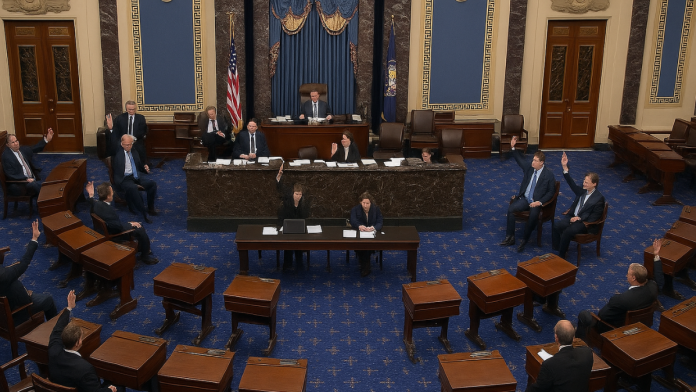In a rare move, the United States Senate has voted to overturn President Donald Trump’s global tariff policy that affected trade with more than 100 countries. The decision, passed with a narrow 51–47 vote, marks a significant challenge to Trump’s trade agenda.
The resolution aims to nullify the “reciprocal” tariffs that Trump had imposed through an executive order. These tariffs were designed to encourage other nations to lower their trade barriers, but critics argue that they ultimately increased costs for American consumers and businesses.
Four Republicans joined Democrats to support the resolution. It was the third time in one week that the Senate voted against tariff measures linked to Trump’s administration, following earlier votes to block tariffs involving Brazil and Canada.
Lawmakers said the move was not only about tariffs but also about protecting the authority of Congress in economic policymaking. Many senators believe that trade policies should not be determined solely through executive action without proper legislative oversight.
Republicans Break Ranks in Rare Bipartisan Push
Going against a sitting president from their own party is unusual, but a few Republican senators broke ranks this week. Susan Collins of Maine, Mitch McConnell and Rand Paul of Kentucky, and Lisa Murkowski of Alaska joined Democrats to vote against the tariffs.
Their decision highlighted the growing frustration among lawmakers who say that Trump’s tariff policies have strained relations with key allies and trading partners. Some senators argued that these global tariffs hurt American industries, particularly agriculture and manufacturing, by sparking retaliatory trade actions from other countries.
The Senate’s rare bipartisan vote reflected an effort to restore balance in trade policymaking. Lawmakers from both sides expressed concern that the tariffs had made imports more expensive, reduced exports, and increased uncertainty for US businesses.
Despite the political risks, several senators emphasised the importance of sending a message to the White House that trade decisions should not bypass Congress.
Trump Strikes New Trade Deal in Asia
The Senate’s action came as Trump wrapped up a week-long visit to Asia. During his trip, he reached a deal with China to reduce tariffs on certain Chinese goods and to encourage China to purchase more American soybeans—a major issue during the earlier trade wars that hurt US farmers.
The timing of the Senate vote added more pressure on the administration, as it showed bipartisan concern about the president’s trade approach. Lawmakers hope that their stand will encourage a more balanced and consultative trade policy going forward.
Senator Tim Kaine of Virginia noted that even symbolic moves like this could influence the president’s decisions. “I did learn in the first Trump term that the president is responsive to things like this. When he sees Republicans starting to vote against his policies, even in small numbers, that makes an impression on him and can often cause him to alter his behaviour,” Kaine said.
For many senators, the issue is not just about trade but also about limits on executive power. They want Congress to have a stronger role in deciding how and when tariffs are applied, especially when they affect the global economy.
House Rule Blocks Similar Action
While the Senate vote sends a strong political message, it is unlikely to lead to any immediate policy change. The House of Representatives, which is under Republican control, has already passed a rule that prevents any resolutions related to tariffs from being brought to the floor for a vote.
This means the Senate’s decision is mostly symbolic, though it highlights the growing divide between the legislative and executive branches over trade authority. Lawmakers opposing the tariffs say they want to reassert Congress’s constitutional role in shaping trade policy.
Although the resolution may not advance further, the Senate vote stands as one of the most direct challenges yet to Trump’s trade agenda. It underscores the growing willingness of lawmakers—from both parties—to question the economic decisions made by the executive branch.


